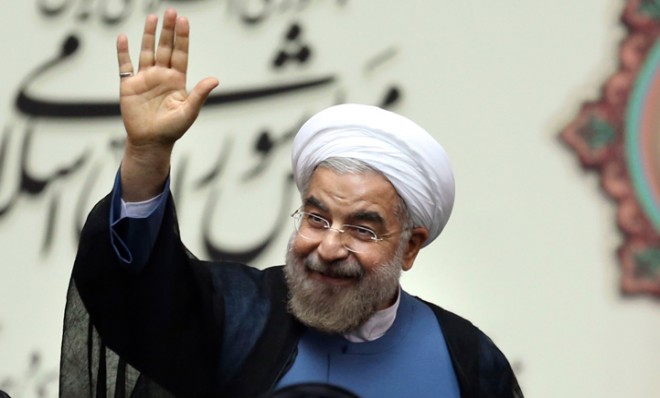Is Iran's new president the reformist the world has been waiting for?
Hassan Rouhani could be the "anti-Ahmadinejad"


A free daily email with the biggest news stories of the day – and the best features from TheWeek.com
You are now subscribed
Your newsletter sign-up was successful
Iran's Islamist leaders don't have a particularly good track record with charm offensives.
The country's new president, reformist cleric Hassan Rouhani, is trying to change that as he heads to the U.S. for the first time since taking office in August, to attend the annual opening session of the United Nations General Assembly in New York.
Rouhani's government released 11 prominent political prisoners on Wednesday in a gesture of goodwill. He also told NBC News that Iran "will never develop nuclear weapons," and that he has the "full authority to make a nuclear deal with the West."
The Week
Escape your echo chamber. Get the facts behind the news, plus analysis from multiple perspectives.

Sign up for The Week's Free Newsletters
From our morning news briefing to a weekly Good News Newsletter, get the best of The Week delivered directly to your inbox.
From our morning news briefing to a weekly Good News Newsletter, get the best of The Week delivered directly to your inbox.
"The problem won't be from our side," Rouhani said.
The soothing tone certainly presents a striking contrast to the fiery speeches of Mahmoud Ahmadinejad, Iran's last president. Ahmadinejad was infamous for using the General Assembly as a platform to call the Holocaust a myth. Rouhani, on the other hand, tweeted a "Happy Rosh Hashana" message to Jews.
At the U.N., look for Rouhani to portray himself as "the anti-Ahmadinejad," Gary G. Sick tells the Council on Foreign Relations. Instead of bashing Israel, Rouhani will be "talking about the kind of role that Iran can play, a much more constructive role in international politics," Sick says.
Rouhani and President Obama have even exchanged letters, a correspondence that the Iranian president has called "positive and constructive." M. Hashem Pesaran says at the Guardian that the West should jump at this chance to make a deal with Rouhani; otherwise the West could weaken moderates and give hard-liners the upper hand, ensuring that Iran remains yet another powder keg in the Middle East for years to come.
A free daily email with the biggest news stories of the day – and the best features from TheWeek.com
Hurt by sanctions and economic mismanagement, the majority of Iranians have chosen a moderate politician to engage with Western countries and to reach a diplomatic solution. Iran's presidential election process is not ideal; nevertheless, this most recent vote was freer than the election processes in many Middle Eastern countries that enjoy the support of the West. Instead of demonstrating unswerving hostility towards Iran, it is vital for Western countries to understand the situation and create an atmosphere that will help to further empower the moderates within Iran. [Guardian]
Skeptics point out that the president of Iran is not the one who holds the reins of power, which remain in the hands of the country's intractable supreme leader, Ayatollah Ali Khamenei. Dr. Hooshang Amirahmadi, president of the American Iranian Council, tells NBC News that, no matter what Rouhani tells the General Assembly, it would be naive to expect him to be able to deliver.
"You have to remember that he got barely 50 percent of the vote," he says. "So his enemies within Iran have not gone away and he hardly has a mandate to negotiate."
However, others see Khamenei as willing to give Rouhani some leeway. "This is the first time that Mr. Obama has written directly to an Iranian president, and not the supreme leader," says Mark Landler at The New York Times. "That suggests that the White House believes Ayatollah Khamenei has empowered Mr. Rouhani, at least for now, to seek an opening with the West."
Furthermore, it has been reported that Rouhani could bring some concrete proposals with him to the U.N., including a limit on uranium enrichment centrifuges — and perhaps even a shutdown of the nuclear facility at Fordo, according to Der Spiegel.
Andrew Sullivan at The Dish concludes that Obama should go "for a legacy-making agreement" with Rouhani.
We should have no illusions that Rouhani is some kind of Western liberal. We should have no illusions that he, rather than Khamenei, is calling the shots. But since the regime insists it doesn't want and hasn't built a nuclear weapon, and since the sanctions on the country have indeed been crippling (with inflation now accelerating fast), and since the regime still has only tenuous public support, largely outside the main urban centers, it makes sense for Rouhani to explore the chances of a deal that would end Iran's diplomatic and economic isolation in return for adherence to non-proliferation, guaranteed by international inspectors. [The Dish]
Harold Maass is a contributing editor at The Week. He has been writing for The Week since the 2001 debut of the U.S. print edition and served as editor of TheWeek.com when it launched in 2008. Harold started his career as a newspaper reporter in South Florida and Haiti. He has previously worked for a variety of news outlets, including The Miami Herald, ABC News and Fox News, and for several years wrote a daily roundup of financial news for The Week and Yahoo Finance.
-
 How to Get to Heaven from Belfast: a ‘highly entertaining ride’
How to Get to Heaven from Belfast: a ‘highly entertaining ride’The Week Recommends Mystery-comedy from the creator of Derry Girls should be ‘your new binge-watch’
-
 The 8 best TV shows of the 1960s
The 8 best TV shows of the 1960sThe standout shows of this decade take viewers from outer space to the Wild West
-
 Microdramas are booming
Microdramas are boomingUnder the radar Scroll to watch a whole movie
